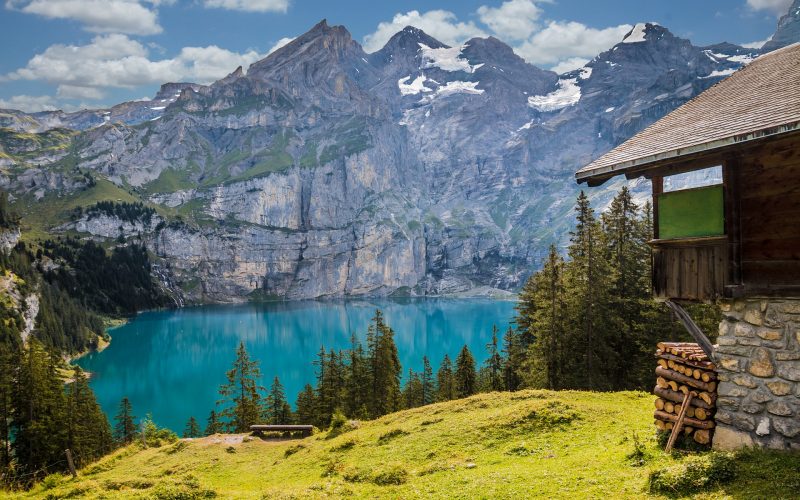Do you live abroad and dream of owning a mountain chalet in Valais? Are you a foreign national living in Switzerland and wishing to purchase a main residence in Swiss territory? Follow in the footsteps of Alex, Dimitri, Saskia and Emily, and learn all there is to know about buying a property in Switzerland!
What is LFAIE ?
As a foreign national, you can purchase a property in Switzerland under certain conditions. These are determined by the federal law on the purchase of properties by people from overseas (known as LFAIE in French), which came into force in 1985. The LFAIE’s implementation falls under the jurisdiction of the cantons. The federal regulations are interpreted and applied more or less strictly according to the authorities of each canton. The LFAIE is known as “Lex Koller” after the Christian Democratic Party federal councillor, Arnold Koller. This law aims to limit the effects of speculation by foreign nationals in the Swiss property market.
The law is fairly complex. It varies according to the type of residency permit you have in Switzerland, your country of origin and your place of residence. The law also depends on the usage that you give to the property in question: main residence, holiday home, commercial premises etc. Also be aware that “property” is divided into different categories. These include villas, apartments, plots and buildings.
Who does the LFAIE concern?
You are subject to the LFAIE and must obtain authorisation to have the right to purchase a property in Switzerland if you reside abroad. You are also subject to it if you are a foreign resident living in Switzerland but not from a country in the European Union (EU) or the European Free Trade Association (EFTA), and do not possess a valid C residence permit. However, if you hold a B residence permit, you will not need authorisation but will be subject to certain restrictions. To fully understand the details of the LFAIE, read the case studies below.
Alex is Belgian and lives and works in Geneva. This foreign national would like to purchase a property as his main home. His Russian colleague, Dimitri, would like to do the same.
As a citizen of an EU country and holding a B residence permit, Alex is considered in the same way as a Swiss national. He can freely purchase one or several main or secondary residences, for himself or as an investment.
Dimitri, the Russian (a national of a country outside the European Union and holding a B residence permit), can also buy a property without authorisation. He must, though, undertake in the deed of sale to treat it as his main residence. He must purchase it in his own name and not through a company. He also cannot let it. There are certain restrictions concerning the surface area of the plot in order to prevent capital investment.
If Dimitri obtains a C residence permit, he will no longer be subject to these restrictions. Like his compatriots residing back home, he has the right to purchase a property destined for commercial or industrial use in Switzerland. He must though ensure that the reserve land does not exceed one third of the total unbuilt area on the plot. This is relevant for the purchase of an entire plot and not an office built in a shared-ownership building, for example.
Saskia lives in the Netherlands and is considering buying a second home in a mountain resort
Saskia lives abroad and is therefore subject to the LFAIE’s restrictions. Saskia must contact the relevant authorities in the canton in which the property is located to obtain an authorisation. This will only be granted within the quota, fixed at 1500 properties per year for the whole of Switzerland. These are spread among the cantons which have municipalities considered to be “tourist recreational zones”. The list of the cantons concerned includes, for example, Valais, Ticino, Vaud, Grisons and Bern. Geneva and Zurich are not included. These quotas aim to conserve certain regions which receive large numbersof tourists from foreign influence and guard against the concept of “cold beds”, as it is known in French. The maximum surface area fixed by the LFAIE is 200 m2; for plots it is 1000 m2, with certain possible exceptions. Saskia may only let her property temporarily. She may only sell it after five years.
The American, Emily, would like to build a holiday home in Switzerland
Like Saskia, Emily lives abroad. This means she may only buy a holiday home located in a clearly stated tourist zone. As this concerns a new building project, she must also ensure she respects the conditions laid out in the Federal law on secondary residences (known by the French acronym, LRS). The LRS is known by the name “Lex Weber” and came into force in 2016. She is subject to this law in the same way as Swiss nationals. It outlaws all new building of second homes in municipalities in which these already make up more than 20%. Emily must take into consideration the amendment to the Law on Spatial Planning (LAT in French), which stipulates that urban development must above all take place in zones which have already been built upon. This amendment aims to curb uncontrolled development.
#In summary: as a foreign national, you can buy a property in Switzerland. However, there are major restrictions, and they differ from case to case. Call upon a specialist to make your initiative a success! The team of our member Comptoir Immobilier will be delighted to assist you.
Sources:
- Common platform of the Confederation and the Cantons: https://www.ch.ch/en/real-estate-foreign-national/
- Secretariat of the Chamber of notaries (in French): https://notaires-geneve.ch/fr/activites-immobilier-je-suis-etranger
